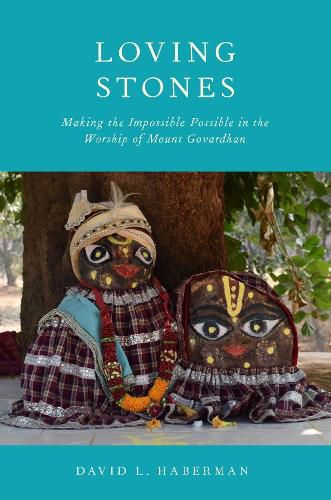Readings Newsletter
Become a Readings Member to make your shopping experience even easier.
Sign in or sign up for free!
You’re not far away from qualifying for FREE standard shipping within Australia
You’ve qualified for FREE standard shipping within Australia
The cart is loading…






Loving Stones is a study of devotees’ conceptions of and worshipful interactions with Mount Govardhan, a sacred mountain located in the Braj region of north-central India that has for centuries been considered an embodied form of Krishna. It is often said that worship of Mount Govardhan makes the impossible possible. In this book, David L. Haberman examines the perplexing paradox of an infinite god embodied in finite form, wherein each particular form is non-different from the unlimited. He takes on the task of interpreting the worship of a mountain and its stones for a culture in which this practice is quite alien. This challenge involves exploring the interpretive strategies that may explain what seems un-understandable, and calls for theoretical considerations of incongruity, inconceivability, and other realms of the impossible. This aspect of the book includes critical consideration of the place and history of the pejorative concept of idolatry (and its twin, anthropomorphism) in the comparative study of religions. Loving Stones uses the worship of Mount Govardhan as a site to explore ways in which scholars engaged in the difficult work of representing other cultures struggle to make the impossible possible.
$9.00 standard shipping within Australia
FREE standard shipping within Australia for orders over $100.00
Express & International shipping calculated at checkout
Loving Stones is a study of devotees’ conceptions of and worshipful interactions with Mount Govardhan, a sacred mountain located in the Braj region of north-central India that has for centuries been considered an embodied form of Krishna. It is often said that worship of Mount Govardhan makes the impossible possible. In this book, David L. Haberman examines the perplexing paradox of an infinite god embodied in finite form, wherein each particular form is non-different from the unlimited. He takes on the task of interpreting the worship of a mountain and its stones for a culture in which this practice is quite alien. This challenge involves exploring the interpretive strategies that may explain what seems un-understandable, and calls for theoretical considerations of incongruity, inconceivability, and other realms of the impossible. This aspect of the book includes critical consideration of the place and history of the pejorative concept of idolatry (and its twin, anthropomorphism) in the comparative study of religions. Loving Stones uses the worship of Mount Govardhan as a site to explore ways in which scholars engaged in the difficult work of representing other cultures struggle to make the impossible possible.